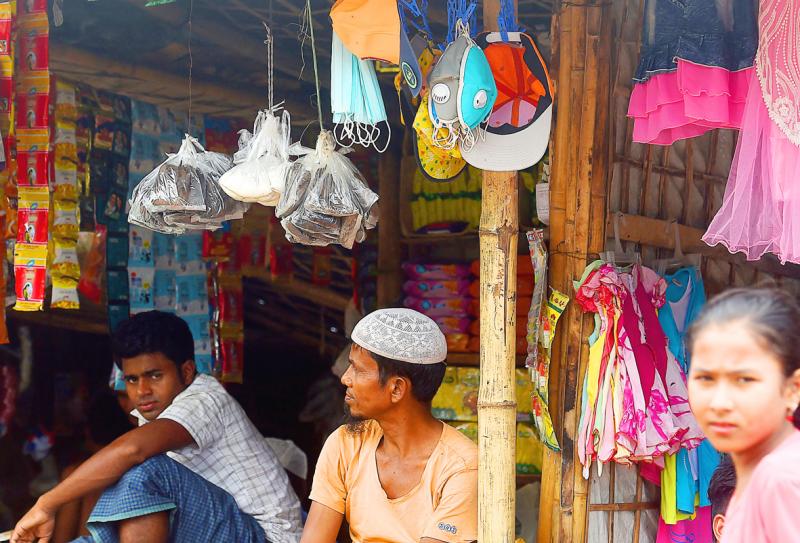Almost 1 million Rohingya refugees stuck in Bangladesh yesterday marked three years since escaping from Myanmar, with the COVID-19 pandemic forcing them to hold a day-long “silent protest” inside their flimsy, leaky huts.
An August 2017 military operation — that has triggered genocide charges at the UN’s top court — drove 750,000 Rohingya out of Myanmar’s Rakhine State into neighboring Bangladesh, to join 200,000 who fled earlier.
Three years later and with no work or decent education for their children, there is little prospect of a return to the country, where members of the mostly Muslim minority have long been treated as inferior intruders.

Photo: AFP
Myanmar’s military “killed more than 10,000 of our people. They carried out mass murders and rapes and drove our people from their home”, said Mohib Ullah, a Rohingya leader in the camps.
For the second anniversary last year, Ullah led a rally of about 200,000 protesters at Kutupalong, the largest of the network of camps in southeast Bangladesh, where 600,000 people live in cramped and unsanitary conditions.
However, the Bangladeshi authorities, increasingly impatient with the Rohingya and who a year earlier cut Internet access in the camps, have banned gatherings because of the pandemic.
The sprawling camps have been cut off from the rest of Bangladesh, with the military erecting barbed-wire fences around the perimeters. Inside, movement has been restricted.
Fears the deadly virus could spread like wildfire — because physical distancing is almost impossible — have not been borne out, with just 84 infections confirmed and six deaths.
The Rohingya would mark “Genocide Remembrance Day” with silence and prayers in their rickety homes all day, Ullah said.
“There will be no rallies, no work, no prayers at mosques, no [non-governmental organization] or aid activities, no schools, no madrasas and no food distribution,” he added.
Bangladesh has signed an agreement with Myanmar to return the refugees, but the Rohingya refuse to go without guarantees for their safety and proper rights.
About 600,000 Rohingya remain in Myanmar, but most are not regarded as citizens, living in what Amnesty International has said are apartheid conditions.
The Rohingya are not convinced of the “sincerity of the Myanmar authorities,” Bangladeshi Foreign Secretary Masud bin Momen said.
Khin Maung, a 25-year-old Rohingya activist who lost 10 relatives in the horrors of 2017, said that the mood in the camps was very depressed.
“We want justice for the murders. We also want to go back home, but I don’t see any immediate hopes. It may take years,” said Maung, who leads a Rohingya youth group.

POLITICAL PRISONERS VS DEPORTEES: Venezuela’s prosecutor’s office slammed the call by El Salvador’s leader, accusing him of crimes against humanity Salvadoran President Nayib Bukele on Sunday proposed carrying out a prisoner swap with Venezuela, suggesting he would exchange Venezuelan deportees from the US his government has kept imprisoned for what he called “political prisoners” in Venezuela. In a post on X, directed at Venezuelan President Nicolas Maduro, Bukele listed off a number of family members of high-level opposition figures in Venezuela, journalists and activists detained during the South American government’s electoral crackdown last year. “The only reason they are imprisoned is for having opposed you and your electoral fraud,” he wrote to Maduro. “However, I want to propose a humanitarian agreement that

ECONOMIC WORRIES: The ruling PAP faces voters amid concerns that the city-state faces the possibility of a recession and job losses amid Washington’s tariffs Singapore yesterday finalized contestants for its general election on Saturday next week, with the ruling People’s Action Party (PAP) fielding 32 new candidates in the biggest refresh of the party that has ruled the city-state since independence in 1965. The move follows a pledge by Singaporean Prime Minister Lawrence Wong (黃循財), who took office last year and assumed the PAP leadership, to “bring in new blood, new ideas and new energy” to steer the country of 6 million people. His latest shake-up beats that of predecessors Lee Hsien Loong (李顯龍) and Goh Chok Tong (吳作棟), who replaced 24 and 11 politicians respectively

Young women standing idly around a park in Tokyo’s west suggest that a giant statue of Godzilla is not the only attraction for a record number of foreign tourists. Their faces lit by the cold glow of their phones, the women lining Okubo Park are evidence that sex tourism has developed as a dark flipside to the bustling Kabukicho nightlife district. Increasing numbers of foreign men are flocking to the area after seeing videos on social media. One of the women said that the area near Kabukicho, where Godzilla rumbles and belches smoke atop a cinema, has become a “real

‘WATER WARFARE’: A Pakistani official called India’s suspension of a 65-year-old treaty on the sharing of waters from the Indus River ‘a cowardly, illegal move’ Pakistan yesterday canceled visas for Indian nationals, closed its airspace for all Indian-owned or operated airlines, and suspended all trade with India, including to and from any third country. The retaliatory measures follow India’s decision to suspend visas for Pakistani nationals in the aftermath of a deadly attack by shooters in Kashmir that killed 26 people, mostly tourists. The rare attack on civilians shocked and outraged India and prompted calls for action against their country’s archenemy, Pakistan. New Delhi did not publicly produce evidence connecting the attack to its neighbor, but said it had “cross-border” links to Pakistan. Pakistan denied any connection to